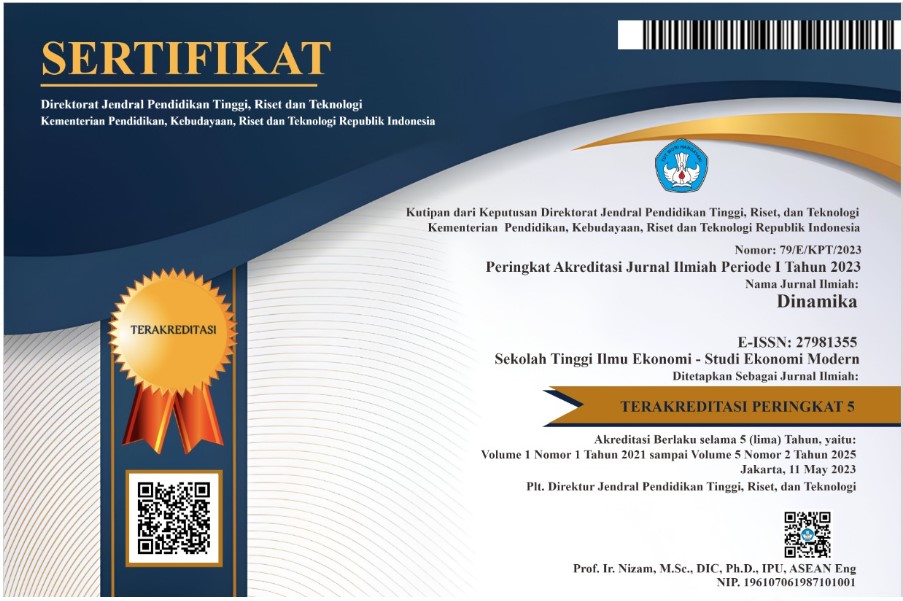INOVASI BISNIS PARIWISATA INDONESIA PASCA PANDEMI COVID-19
DOI:
https://doi.org/10.51903/dinamika.v4i1.433Keywords:
Tourism industry, business innovation, COVID-19 pandemic, recovery, strategy, IndonesiaAbstract
The tourism industry plays an important role in economic growth, both at the international and national levels. However, the COVID-19 pandemic has caused a global crisis that has hit the tourism sector around the world, including Indonesia. Restrictions on movement and mobility of people between regions, health concerns, and uncertainty have led to a drastic decline in tourism activity and the tourism sector has seen a significant drop in revenue. This has had a social impact, with many workers in the tourism sector losing their jobs or experiencing significant pay cuts. To recover the tourism sector, business innovation in the tourism sector can be done, including in terms of marketing and finding new markets. The government and tourism industry players work together to develop policies and strategies for sustainable tourism growth. This article discusses business innovation in tourism in Indonesia after the COVID-19 pandemic, especially regarding improving the attractiveness and experience of tourist visitors, as well as operational efficiency while supporting nature and animal conservation efforts at Taman Safari Indonesia in Bogor. The method used in this article is a literature study using qualitative data. The data used comes from journals, scientific papers, and news from several online news sources that have been published in advance, which represent several cases and situations of the tourism industry in Indonesia before, during, and after the COVID-19 pandemic. The results of this research are several innovations including improving Virtual Experiences, developing Digital Applications and Platforms, Using "Contactless" Technology, focusing on natural attractions that encourage tourist interest and visits. These innovations can help tourism businesses in Indonesia overcome the impact of the COVID-19 pandemic on the number of tourist visits and tourism revenue. In addition, these business innovations can also help overcome the negative impacts and support the recovery of the tourism sector in Indonesia.
References
[2] Baregheh, A., Rowley, J., & Sambrook, S. (2009). Towards a Multidisciplinary Definition of Innovation. Management Decision, 47(8), 1323–1339.
[3] Bedford, J., Enria, D., Giesecke, J., Heymann, D. L., Ihekweazu, C., Kobinger, G.,
[4] Yavlinsky, A. (2020). COVID-19: towards controlling of a pandemic. The Lancet, 395(10229), 1015-1018.
[5] Butler, R. W., & Boyd, S. W. (2017). Tourism and National Parks: Issues and Implications. CABI.
[6] Chesbrough, H. W. (2006). Open Innovation: A New Paradigm for Understanding Industrial Innovation. In H. W. Chesbrough, W. Vanhaverbeke, & J. West (Eds.), Open Innovation: Researching a New Paradigm (pp. 1–12). Oxford University Press.
[7] Chesbrough, H. W. (2003). Open Innovation: The New Imperative for Creating and Profiting from Technology. Harvard Business Press.
[8] Christensen, C. M., & Raynor, M. E. (2003). The Innovator's Solution: Creating and Sustaining Successful Growth. Harvard Business Review Press.
[9] Fauci, A. S., Lane, H. C., & Redfield, R. R. (2020). COVID-19—Navigating the uncharted. New England Journal of Medicine, 382(13), 1268-1269.
[10] Gössling, S., Scott, D., & Hall, C. M. (2013). Tourism and Water: Interactions and Impacts. Channel View Publications.
[11] Hale, T., Petherick, A., Phillips, T., & Webster, S. (2020). Variation in government responses to COVID-19. Blavatnik School of Government Working Paper, 31.
[12] Jamal, T., & Getz, D. (1995). Collaboration theory and community tourism planning. Annals of Tourism Research, 22(1), 186-204.
[13] Jamal, T., & Robinson, M. (2011). The SAGE Handbook of Tourism Studies. Sage Publications.
[14] Kusnandar, V.B. (2023). Penerimaan Devisa Pariwisata Ditargetkan US$2,9-5,9 Miliar pada 2023. Diakses dari : https://databoks.katadata.co.id/datapublish/2023/05/29/penerimaan-devisa- pariwisata-ditargetkan-us29-59-miliar-pada-2023
[15] Mathieson, A., & Wall, G. (2018). Tourism: Economic, Physical and Social Impacts. Pearson UK.
[16] Murphy, P. E. (2013). Tourism: A Community Approach. Routledge.
[17] Nicola, M., Alsafi, Z., Sohrabi, C., Kerwan, A., Al-Jabir, A., Iosifidis, C., ... & Agha, R. (2020). The socio-economic implications of the coronavirus and COVID-19 pandemic: A review. International Journal of Surgery, 78, 185- 193.
[18] Page, S., & Connell, J. (2014). Tourism: A Modern Synthesis. Cengage Learning. Pearce, D. G. (2018). Tourist attraction systems: Exploring cultural behavior. Channel View Publications.
[19] Rogers, E. M. (2003). Diffusion of Innovations (5th ed.). Free Press. Sharpley, R. (2014). Tourism, Tourists and Society (2nd ed.). Routledge
[20] Tribe, J. (2010). The Economics of Recreation, Leisure and Tourism. Elsevier.
[21] Weaver, D. B., & Lawton, L. J. (2014). Tourism management. John Wiley & Sons. WHO. (2020). Coronavirus disease (COVID-19) pandemic. World Health Organization.
Downloads
Published
Issue
Section
License
Copyright (c) 2024 Dinamika: Jurnal Manajemen Sosial Ekonomi

This work is licensed under a Creative Commons Attribution-ShareAlike 4.0 International License.












